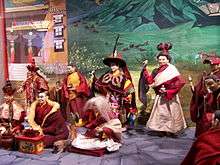Kim Yeshi
Kimberly Sciaky Yeshi (Tibetan name Pema Dolkar, born in 1956) is a French-American anthropologist. In 1988, as a cofounder she opened the Norbulingka Institute near Dharamshala in northern India where she and her husband Kalsang Yeshi seek to preserve Tibetan traditions and culture.[1][2]
Early life and education
Kim's father, Mario Sciaky, was born in Salonica, Greece, and later immigrated to France, then the US, during World War II. Kim's mother, Sara Burkett Sciaky, was born in Mississippi and moved to France in 1947. Kim attended Vassar College in New York State, graduating in 1977 with a B.A. in anthropology. In 1974, she met Kalsang Yeshi in New York City, where he had recently arrived to from India and took Tibetan lessons from him. In 1977, they joined the Tibetan Buddhism PhD program at the University of Virginia, where Kalsang also taught Tibetan language and dialects. Kim obtained an M.A. in Tibetan Studies in 1979.
Kim and Kalsang married in 1979 and moved to Dharamsala in India, where they devoted themselves to preserving Tibetan culture. They had four children; Sonam Choezom (1980), Dechen Lhamo (1982), Gelek Namgyal (1987), and Noryang Lhamo (1989).
Life devoted to Tibet

In 1983, Kim created the Loseling Doll Project, with monks from Drepung Loseling Monastery, making dolls recreating Tibetan costumes and selling them to museums worldwide to raise funds for the Monastery. The dolls were first exhibited in the library of Westminster Abbey following the visit of the Dalai Lama with the support of the UK Tibet Society and soon afterwards in Paris. They are now displayed not only in the Norbulingka Institute but in museums around the world.[3]
In 1988, Kalsang and Kim founded the Norbulingka Institute with the aim of creating an environment for Tibetan artisans; thangka painters, statue makers, applique artists and wood carvers. It was set up as a Trust and inaugurated by the Dalai Lama in 1995. Norbulingka is self-sufficient and now counts over 300 artisans.[1]
The Norbulingka Cultural Centre in particular includes a Japanese garden, a large Tibetan temple, thangka workshops, and above all Kim Yenshi's museum of Tibetan dolls which have been produced by the monks from the temple and represent various regions and occupations in Tibet.[4]
Kim's dream had always been to create a project in Tibet itself, and in 2005, she began researching yak wool which she accurately believed was a valuable asset due to its soft, warm qualities. With the help of her daughter Dechen she set up a workshop in Zorgey Ritoma, Amdo in 2007 creating jobs for the local community.[5] The project began as a way to utilize local resources and create sustainable industry, to give nomads who had too few animals or wished for opportunities other than herding, work in their own villages, rather than having to migrate to local cities looking for jobs. Dechen, her husband Yidam, and three other people from their core team spent time in Cambodia and Nepal studying weaving and spinning techniques, and bought weaving equipment in Katmandu, which they transported to Ritoma. They then hired and trained local nomads who soon became skilled artisans.
Tianjin Satellite Television featured their efforts to train the mostly illiterate workers in a documentary. The workshop employs over 100 workers, most of whom have been employed since 2008.[6] To ensure that the products remain traditional, no synthetic dyes or bleaching are used. Yeshi obtained natural dyes from Switzerland, which produce colors found in the natural landscape of Tibet.[7]
References
- 1 2 Anguin-Cohen, Rebecca (2003). "Culture Works: Kim Sciaky Yeshi '77". Vassar. Retrieved 1 February 2017.
- ↑ Evin, Florence (17 March 2009). ""Tibet, histoire d'une tragédie", de Kim Yeshi : le Tibet, civilisation en danger" (in French). Le Monde. Retrieved 1 February 2017.
- ↑ Odelys, Bertrand (2013). Dharamsala: Chroniques tibétaines. Albin Michel. pp. 125–. ISBN 978-2-226-27141-9.
- ↑ Rediar, Birger (27 August 2016). "Kim Yeshi´" (in Danish). Letter Indra. Retrieved 1 February 2017.
- ↑ Pierce, Emma (2 March 2015). "Q&A with Kim Yeshi". Indagare Magazine.
- ↑ Lin, Qi (19 November 2013). "Yaks for haute couture". Beijing, China: China Daily. Archived from the original on 2 January 2015. Retrieved 2 February 2017.
- ↑ Wei, Annie (19 February 2013). "Norlha's shawls an exquisite investment". Beijing, China: Beijing Today. Retrieved 2 February 2017.